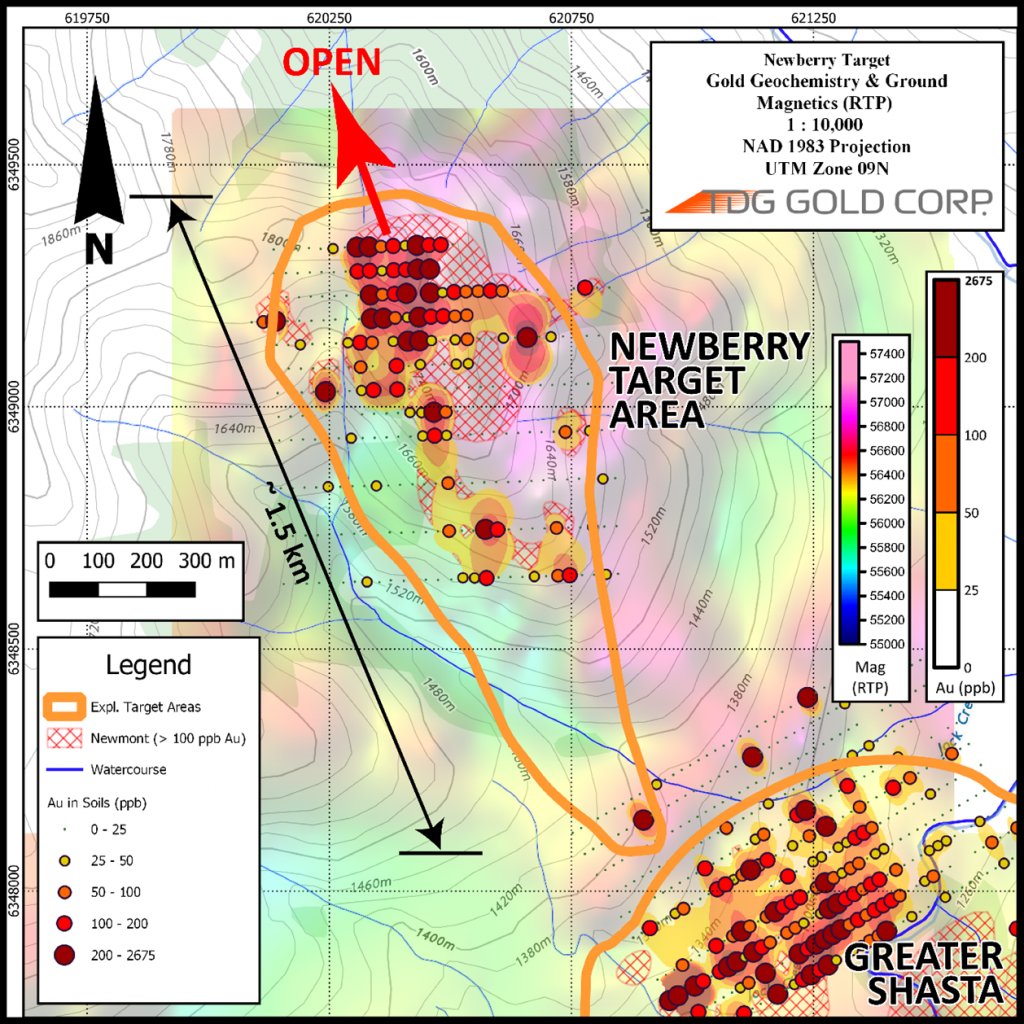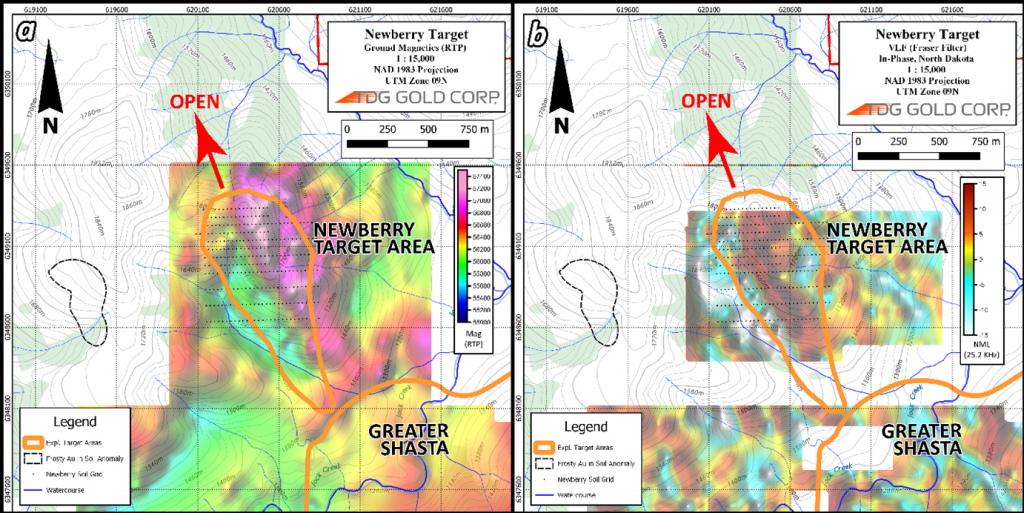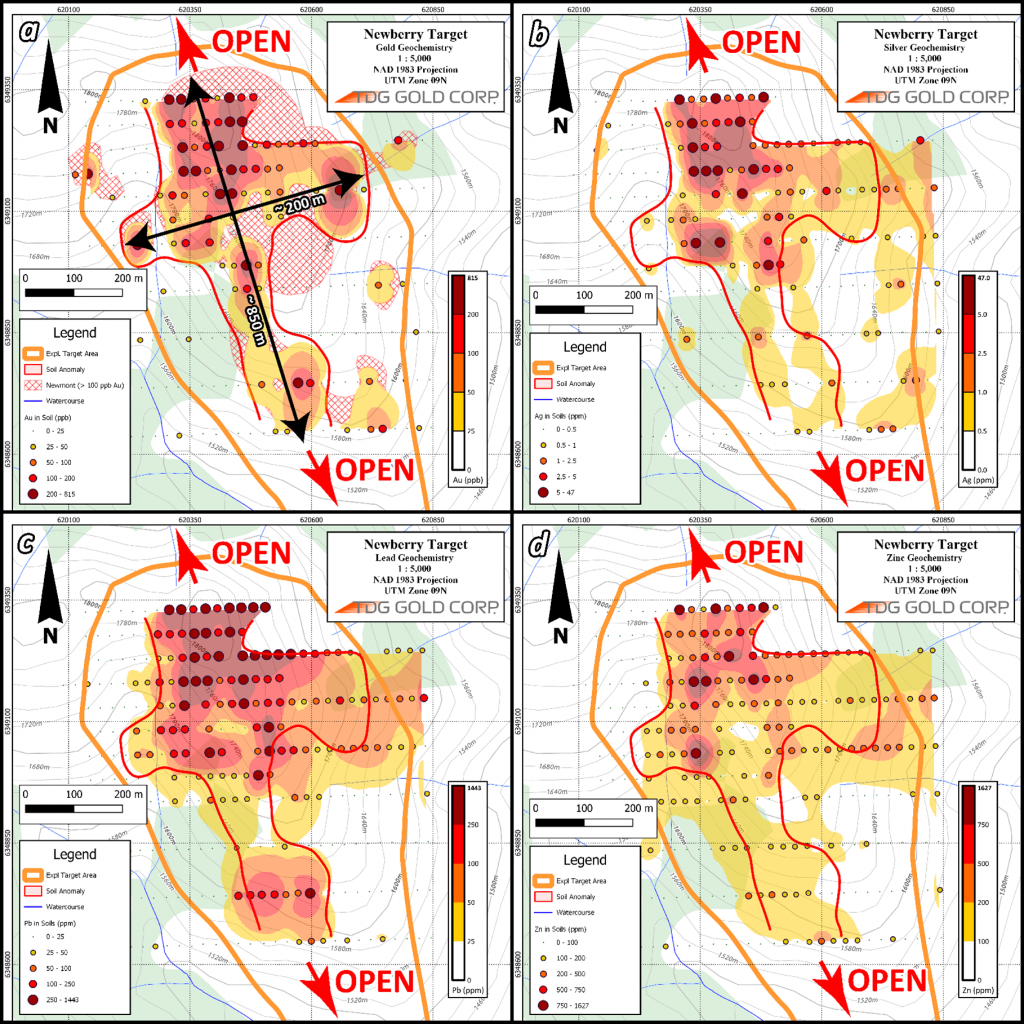TDG GOLD CORP. DEFINES NEWBERRY EXPLORATION TARGET AREA ADJACENT TO GREATER SHASTA
White Rock, British Columbia, January 24, 2023 – TDG Gold Corp – (TSXV: TDG) (the “Company” or “TDG”) is pleased to report the results of geophysical survey work completed by TDG in 2022 at its Newberry target which, in combination with historical soil geochemistry results, confirm an exploration target area of approximately 1.5 kilometres (“km”) of strike length by a maximum width of approximately 500 metres (“m”) and with a vertical extent of up to 400 m. As previously reported by TDG (link), Newberry may be related to Greater Shasta – the gap between the two target areas is now < 100 m (Figure 1).
Steven Kramar, TDG’s VP Exploration, comments: “The magnetic and VLF signatures from our 2022 geophysical survey work at Newberry are coincident with the recompiled historical soil geochemical results. This means that we can consider Newberry drill ready. And the fact that the southern extent of the Newberry exploration target area is within 100 metres from the edge of our recently expanded, 5.5 sq.km Greater Shasta exploration target area makes Newberry a high priority target for TDG in 2023. A special thanks to Bruce Downing, original member of the Newmont discovery team at Shasta and Newberry, for his kind assistance in recompiling the historical data and information and his visit to site in July 2022.”

2022 Geophysical Survey Results
The Newberry prospect is a large multi-element geochemical and geophysical anomaly associated with moderate to intense alteration north west of and along strike from the Greater Shasta exploration target zone (See TDG News Release January 17, 2023). The prospect was first identified in the early 1970s during follow-up of anomalous precious metals in stream sediment sampling and underwent sporadic prospecting by Shasta Mines and Oil Ltd., later International Shasta Oil and later by Newmont in 1983-84, and Esso Minerals in 1987. Shasta Oil and Newmont completed grid sampling that included collection of 74 and 202 conventional -80 mesh soil samples, respectively. Both groups completed ground magnetic and Very Low Frequency (“VLF”) Electromagnetic (“EM”) surveys. Newmont also discovered the Shasta deposit during the same field program. The property was recommended for drilling but was caught up in litigation between operators for many years, and therefore no further work at Newberry was completed. The Shasta mining lease and surrounding mineral claims were subsequently consolidated – removing this impediment to exploration. TDG acquired the consolidated tenures in December 2020.
The area was historically surveyed with conventional EM-16R VLF instruments and ground magnetometers, which reportedly outlined north-northwest trending linear trends of high apparent conductivity and high apparent resistivity, but the raw data has not been recovered to date. TDG applied the same exploration approach used by Newmont consisting of a soil geochemistry in combination with ground magnetics and VLF surveying.
The survey area was covered by a high precision airborne VTEM, aeromagnetic and radiometric survey in 2017 which delineated several linear geophysical features in the target area including a pronounced linear magnetic susceptibility low coincident with the Creek and JM zones within the Shasta Deposit along strike to the south and continuous to the north to the Newberry prospect. This magnetic susceptibility low likely reflects destruction of magnetite, common in the volcanic and epiclastic rocks in the area, and alteration by hydrothermal fluids and represents the alteration halo around mineralized zones.
TDG conducted ground magnetic and VLF surveys in 2022 and outlined a sharp magnetic gradient from ground magnetics (Figure 2a) and conductive feature from Fraser Filtered VLF EM surveys (Figure 2b) that corresponds to the soil and alteration anomaly and suggest the feature, presumably the expression of the West Fault mapped by Marsden and Moore (1990), and may be associated with mineralization and may extend along strike to the NW and SE for considerable distances beyond the soil grid limits.

Newberry Geology & Geochemistry
The property has been the subject of reconnaissance scale geologic mapping, but outcrop is sparse and discontinuous. Several faults have been mapped across the property that parallel or overlap with soil geochemical and geophysical anomalies. Grid soil sampling by previous operators has delineated an open-ended, oblong, NNW trending multielement gold (“Au”) + silver (“Ag”) + lead (“Pb”) + zinc (“Zn”) anomaly that ranges from 100 m wide at its southern end to 350 m in width at its northern end (Figure 3a-d). The area of anomalous metals is at least 850 m long and extends to the limits of the existing grid and is open in along strike. Metal enrichments from soils within the anomaly are significantly higher than the overall grid background levels (Table 1). Five grab, talus and outcrop rock samples collected by previous operators from within the soil anomaly and area of alteration average 1.6 grams per tonne (“g/t”) Au, 66 g/t Ag, 217 parts per million (“ppm”) copper (“Cu”), 0.21 percent (“%”), Pb and 0.43 % Zn. Steep slopes suggest some downslope dispersion of the anomalous soils from their likely source areas near the crest of the hill.
As noted above, Marsden and Moore (1990) mapped a north-northwest trending down to the east fault across the area, which they named the West Fault, that is coincident with the soil anomaly, outcropping alteration and mineralization. It appears to trend towards the trace of the Shasta Fault, but glacial and alluvial cover in the intervening area makes accurate mapping from surficial exposures difficult and it may be a separate structure and the sense of displacement appears opposite than the main Shasta Fault. In the area of the Newberry prospect, rocks that are poorly exposed west of the fault include a complex sequence of quartz-free biotite-hornblende-feldspar-phyric volcanic breccia and spherulitic lapilli tuffs. Rocks exposed east of the fault consist of an interpreted younger package of grey dacite known as the Saunders Creek Dacite that consists of dark grey Iapilli tuffs containing quartz, biotite, hornblende and feldspar crystals, moderately flattened feldspar-phyric lapilli and intrusive fragments that are contained both within the lapilli and the matrix. The matrix consists of flattened and welded glass shards. Both these units are texturally and compositionally similar to those that occur in the hanging wall and footwall to the Shasta Deposit, 2 km to the south-southeast, but are interpreted to be higher and younger in the volcanic stratigraphic section by Marsden and later operators.
Mapped alteration around the prospect consists of calcite and quartz cemented breccias, quartz flooding and salmon-pink potassium feldspar replacement of the rock matrix, crystals and lithic fragments. Extensive iron oxides are present producing a small gossanous area near the top of the hill and the iron oxides appear to be the results of weathering of iron-rich lithologies and weathered sulfides minerals and the quartz-potassium feldspar flooding patterns mimic the trace of the soil anomalies and iron oxide occurrences. Sulfides reported from hand specimens include pyrite, sphalerite, galena minor chalcopyrite and their oxidized equivalents.
Table 1 – Newmont Soil Grid Statistics.
| Element | Minimum (Concentration) | Maximum (Concentration) | Grid Mean (Concentration) | Anomalous Zone Mean (Concentration) |
| Au (ppb) | 1 | 815 | 47 | 128 |
| Ag (ppm) | 0.1 | 47 | 1 | 3 |
| Pb (ppm) | 2 | 1443 | 94 | 246 |
| Zn (ppm) | 28 | 1627 | 176 | 361 |

Qualified Person
The technical content of this news release has been reviewed and approved Steven Kramar, MSc., P.Geo., Vice President, Exploration for TDG Gold Corp., a qualified person as defined by National Instrument 43-101.
This news release includes historical information that has been reviewed by the Company’s geological team and qualified person. The Company’s review of the historical records and information reasonably substantiate the validity of the information presented in this news release; however, the Company cannot directly verify the accuracy of the historical data, including the procedures used for sample collection and analysis. There is insufficient exploration on these prospects to define a mineral resource. It is uncertain if after additional exploration a mineral resource will be delineated. Therefore, the Company encourages investors to exercise appropriate caution when evaluating these results.
Exploration Target Areas such as Newberry are considered early-stage exploration projects which do not contain any mineral resources as defined by NI 43-101. The potential quantities and grades disclosed herein are conceptual in nature and there has been insufficient exploration to define a mineral resource for the targets disclosed. It is uncertain if further exploration will result in these targets being delineated as a mineral resource.
About TDG Gold Corp.
TDG is a major mineral claim holder in the historical Toodoggone Production Corridor of north-central British Columbia, Canada, with over 23,000 hectares of brownfield and greenfield exploration opportunities under direct ownership or earn-in agreement. TDG’s flagship projects are the former producing, high grade gold-silver Shasta, Mets and Baker mines, which are all road accessible, produced intermittently between 1981-2012, and have over 65,000 m of historical drilling. The projects have been advanced through compilation of historical data, new geological mapping, geochemical and geophysical surveys, and at Greater Shasta, over 13,000 metres of modern HQ drill testing of the known mineralization occurrences and their extensions. In May 2022, an initial NI 43-101 Mineral Resource Estimate was published for 0.3 sq.km of the 5.5 sq.km exploration target area at Greater Shasta. Additional extensional and new target areas surrounding the project include Newberry which may be connected to Greater Shasta. TDG aims to undertake follow-up exploration and diamond drilling on high priority targets in 2023.
ON BEHALF OF THE BOARD
Fletcher Morgan
Chief Executive Officer
For further information contact:
TDG Gold Corp.,
Telephone: +1.604.536.2711
Email: info@tdggold.com
Neither TSX Venture Exchange nor its Regulation Services Provider (as that term is defined in the policies of the TSX Venture Exchange) accepts responsibility for the adequacy or accuracy of this release.
This news release contains forward-looking statements that are based on the Company’s current expectations and estimates. Forward-looking statements are frequently characterized by words such as “plan”, “expect”, “estimate”, “targets”, “prospective”, “opportunities”, ”potential” and other similar words or statements that certain events or conditions “may” or “will” occur. Such forward-looking statements involve known and unknown risks, uncertainties and other factors that could cause actual events or results to differ materially from estimated or anticipated events or results implied or expressed in such forward-looking statements. Such factors include, among others: the actual results of current exploration activities; conclusions of economic evaluations; changes in project parameters as plans to continue to be refined; possible variations in ore grade or recovery rates; accidents, labour disputes and other risks of the mining industry; delays in obtaining governmental approvals or financing; and fluctuations in metal prices. There may be other factors that cause actions, events or results not to be as anticipated, estimated or intended. Any forward-looking statement speaks only as of the date on which it is made and, except as may be required by applicable securities laws, the Company disclaims any intent or obligation to update any forward-looking statement, whether as a result of new information, future events or results or otherwise. Forward-looking statements are not guarantees of future performance and accordingly undue reliance should not be put on such statements due to the inherent uncertainty therein.